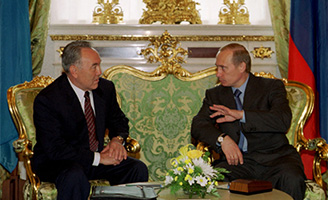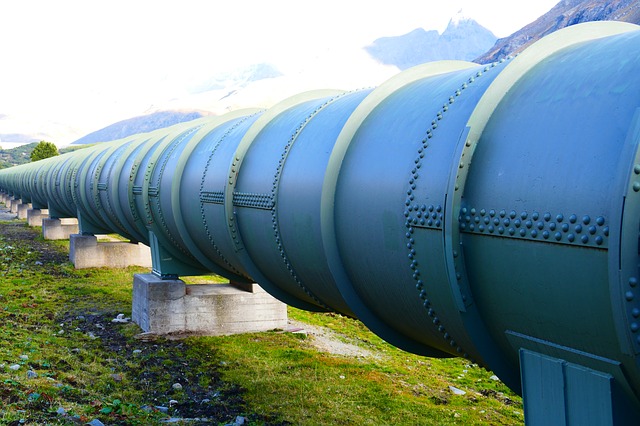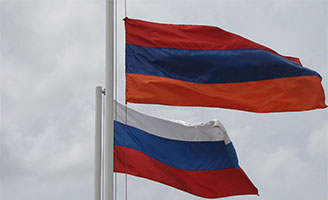Kazakhstan and the EEU
By Dmitry Shlapentokh (03/04/2015 issue of the CACI Analyst)
January 2015 marked the beginning of a new relationship between Russia, Kazakhstan and Belarus bound together by the Eurasian Economic Union (EEU). Yet the emerging friction between Astana and Moscow indicates the pitfalls of the EEU as a project, at least as conceptualized by the Kremlin. In August 2014, Kazakhstan’s and Russia’s leaderships engaged in an exchange of cold remarks. Through late fall (October-November 2014), Russian politicians and journalists discussed the suffering of Russians in Northern Kazakhstan and Russia’s responsibility for their situation. As the EEU was finally inaugurated, economic and geopolitical tensions between Astana and Moscow continued, indicating the EEU’s economic and geopolitical instability.

Is “Turkish Stream” a Serious Threat to the Trans-Caspian Pipeline?
By Juraj Beskid, Tomáš Baranec (03/04/2015 issue of the CACI Analyst)
In early November 2014, Turkey and Turkmenistan signed a Framework Agreement which, if successful, will allow Turkmenistan to provide gas via Turkey directly to the EU, by-passing Russia. Since then, several bold statements from Vladimir Putin and Gazprom representatives suggesting a replacement of the South Stream project with a “Turkish Stream” or closing all pipelines to Europe via Ukraine indicates the start of a new “energy game.” Turkish Stream will to a considerable extent compete with the Trans-Caspian pipeline. Does the Kremlin possess trumps on this issue or is it merely bluffing?

Moscow Pledges to Counteract Georgia’s Integration with NATO
By Eka Janashia (03/04/2015 issue of the CACI Analyst)
The Kremlin continues Russia's annexation of Georgia's breakaway regions and at the same time warns Tbilisi to cease its effort to integrate with NATO. On February 18, breakaway South Ossetia signed a "border treaty" with the Russian Federation, and declared its intention to strike an "Alliance and Integration" deal with Moscow shortly.
The agreement mirrors the "Alliance and Strategic Partnership" agreement inked between Moscow and Sokhumi in November, though envisions a deeper integration of the South Ossetia's defense, security, and customs agencies with those of Russia. An already signed border agreement dictates the abolishment of the border crossing point at the Roki tunnel connecting the South Ossetia to Russia.
The border eradication initiative was first aired by Vladislav Surkov, the Russian president's aide in charge of supervising Moscow's relations with the two de facto republics, on February 17, during a meeting with Abkhazia's de-facto president Raul Khajimba. "There must not be a border between us," Surkov said and added that Russia's financial support for the two breakaway regions would be upheld in the face of Russia's current economic troubles.
The border agreement between Moscow and Tskhinvali is a swift implementation of this initiative. After signing the border treaty, Russia's Foreign Minister Sergey Lavrov expressed the Kremlin's readiness to avert the "negative effect" of "never-ending attempts to drag Tbilisi into NATO."
The Kremlin's apprehension is directed towards the establishment of NATO's "Training and Evaluation Center" (TAEC) in Georgia which, in the words of Russia's permanent representative in NATO Alexander Grushko, provokes Moscow, escalates tension and worsens regional security.
At the recent NATO summit in Wales, Georgia obtained a "substantial package," which along with other supportive tools, aims to enhance Georgia's defense capabilities through launching the TAEC, which could obtain a regional dimension in the future.
As part of this policy, NATO's Deputy Secretary General Alexander Vershbow visited Georgia in January 2015. Vershbow assured that despite the Kremlin's nervous reaction towards the planned NATO-Georgia training center, the alliance will make a resolute effort to create the facility before the end of this year.
He underlined that the TAEC will be "the most visible element of a NATO presence in Georgia." While it will primarily focus on command post exercises, field exercises with participation of foreign troops as well as live and simulated trainings for allied military units committed to the NATO Response Force and Connected Forces initiative might also take place, Vershbow said. He also announced that periodic military exercises involving NATO allies and partner countries will start in Georgia this year.
The Kremlin's reaction to the high NATO official's statement was soon reflected in the border removal initiative and strict declarations on Russia's counter-measures to deal with the undesirable implications of NATO-Georgia cooperation. Zurab Abashidze, the Georgian Prime Minister's special representative for relations with Russia, commented that Moscow, Brussels and Tbilisi all are well-aware "that Georgia's membership to NATO today and tomorrow is not on the agenda" and that Georgia-NATO cooperation "in no way aims at deploying NATO military infrastructure in Georgia."
Later, Defense Minister Mindia Janelidze restated that Georgia has no plans to host a NATO military base and that only the TAEC, aiming to enhance the professionalism of Georgian servicemen and with no additional military functions, will be established. The parliamentary minority immediately slammed these official remarks. The former state minister for European and Euro-Atlantic integration issues, Free Democrat Alexi Petriashvili dubbed Abashidze's statement another proof that the country's Euro-Atlantic course is under threat. The Free Democrats, led by former Defense Minister Irakli Alasania, quit the ruling coalition Georgian Dream (GD) in November with the same motivation.
The United National Movement (UNM) party, in turn, argued that Abashidze had voiced the government's position. The party's leader David Bakradze said that instead of distancing himself from Abashidze's statement, the defense minister had justified it.
Abashidze's statement came a few days before his meeting with Russia's Deputy Foreign Minister Grigory Karasin in Prague. The Karasin-Abashidze format is the only channel for direct communication between Tbilisi and Moscow, established by former PM Bidzina Ivanishvili. The previous government led by Mikheil Saakashvili government did not engage in direct negotiations with the Kremlin and preferred dialogue in an international format with the participation of representatives from partner countries.
While Russia's anti-NATO policy hardly surprised anyone, Abashidze's statement, which the opposition interpreted as appeasing to Moscow, was unexpected and triggered doubts about the consistency of Georgia's Euro-Atlantic aspirations.
Through the border removal initiative as well as the "amalgamation agreements" with South Ossetia and Abkhazia, Russia signals that the establishment of a training center where the troops of NATO partners may hold military exercises is totally unacceptable to Kremlin. Georgia's incumbent government clearly seeks to avoid irritating Moscow, but it yet uncertain to what extent this stance will slow Georgia's NATO integration pace. However, ambiguous moves with regard to Euro-Atlantic policy not only cast doubt on Georgia's achievements at the Wales Summit, but also minimize its chances to reach any tangible success at the Warsaw Summit scheduled for next year.
CACI Analyst, February 18, 2015
CACI Analyst, February 18, 2015 (.pdf)
Contents
Analytical Articles
GYUMRI MURDERS THREATEN TO DISRUPT ARMENIA’S RELATIONS WITH RUSSIA, by Eduard Abrahamyan
SANCTIONS, ENERGY PRICES, AND RUBLE DEPRECIATION CHALLENGE CIS GOVERNMENTS, by Stephen Blank
DAGESTAN’S JIHADISTS AND HARAM TARGETING, by Emil Souleimanov
AZERBAIJAN INVESTS IN UPGRADING ITS TRANSPORT INFRASTRUCTURE, by John C.K. Daly
Field Reports
ARMENIAN PRESIDENT REJECTS TURKISH INVITATION TO ATTEND GALLIPOLI ANNIVERSARY, by Erik Davtyan
POLICE ARRESTED FOR OLD MURDER CASE IN GEORGIA, by Eka Janashia
KYRGYZSTAN DEBATES ELECTORAL SYSTEM REFORM, by Arslan Sabyrbekov
TAJIK PRESIDENT REVIEWS CHALLENGES IN ANNUAL ADDRESS TO PARLIAMENT, by Oleg Salimov
Gyumri Murders Threaten to Disrupt Armenia's Relations with Russia
By Eduard Abrahamyan (02/18/2015 issue of the CACI Analyst)
Armenia’s relationship with Russia has never been simple. Although Russia has considered Armenia a reliable ally since its independence, the relationship has never transformed into a formal partnership. Russia’s policy of double standards on the Nagorno-Karabakh issue and its delivery of weaponry to Azerbaijan has gradually increased distrust in Armenian society towards Russia in recent years. A bloody incident in Gyumri on January 12, 2015, when a soldier from the deployed Russian 102nd military base killed the entire Avetisyan family in their sleep, including two children, has catalyzed a vivid debate in Armenia on the nature of the relationship to Russia.






